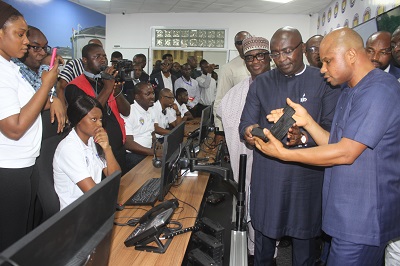
The Vice President, Dr Mahamudu Bawumia, has said that the country loses over 200 million dollars per annum in tax revenues due to illicit activities in the downstream petroleum sector.
He said the illicit activity, which comes in the form of illegal bunkering, smuggling of petroleum products, and dumping of products meant for export on the local market, has become a source of great concern to the government.
“These activities constitute an emerging threat which impact negatively on our maritime security as well as the nation’s efforts in mobilising tax revenue from the sale of petroleum products,” he said.
Dr Mahamudu Bawumia said the dynamics of the illicit activities in the petroleum downstream industry required a multi-pronged solution to ensure sanity in the industry, and charged the National Petroleum Authority (NPA) to enhance and sustain the already irritated technological interventions to arrest the situation.
Dr Bawumia said the act of commissioning of a National Command Centre for Electronic Cargo Tracking System to monitor huge petroleum tankers from loading points to delivery stations to prevent haulage theft and diversions, aims at improving standards and efficiency in the industry.
He said the government believed in the use of appropriate technology to improve product and service delivery, hence the introduction of the tracking system was very appropriate and timely, adding that the adoption of new technologies has helped improve quality of life, work and leisure.
“We have many examples where the application of technology has also helped to improve productivity and allows an industry to remain competitive, provides better job security and creates more employment,” he said.
Dr Bawumia encouraged NPA to vigorously pursue other plans which would enhance their operations while enhancing its collaborative activities with the National Security Council and the Ghana Revenue Authority in finding a lasting solution to be illicit activities in the petroleum downstream industry.
Dr Mohammed Amin Adam, deputy Minister of Energy, said the government was committed to ensuring regular supply of petroleum products to all parts of the country through a cost effective and an efficient distribution system, especially, through the road networks.
He said, despite the flexibility of door-to-door service delivery of petroleum products, there were significant constraints associated with transporting an additional cost with hauling the products, damage to the road infrastructure and increase in road accidents.
Dr Adam said it was therefore important that as a country, there was the need to develop the other modes of transportation such as rail, water and pipelines to be integrated into distribution system to enhance its effectivenessand efficiency adding that the government was strategically placing Bulk Oil Storage and Transportation Company LTD (BOST) to develop the water transport systemas well as the pipeline to convey petroleum product to the northern sector.
He said the Ministry of Energy on its part would ensure a pragmatic review of policies to ensure cost effective and value addition to the petroleum downstream value chain and also ensure that Ghanaians benefit from opportunities within the industry.
Mr Alhassan Tampuli, Chief Executive Officer of NPA said the introduction of the Cargo Trading System was a demonstration of their commitment to improving standards and controls in the distribution of petroleum products in the country.
He said there was no doubt that all sectors of the economy stood to benefit from an efficiently managed downstream oil sector that delivers petroleum products in the right quantity and the required quality at a least cost all times.
“Adequate controls and reliable distribution service for the petroleum downstream sector is very essential for economic development and this sits well with the NPA’s vision, which is to be a catalyst for economic transformation and growth,” he said.
Mr Tampuli said NPA planned to enhance the platform provided by formidable controlling and monitoring system for petroleum products distribution from imports and refinery production to the retail outlets and bulk customers.
BY LAWRENCE MARKWEI






